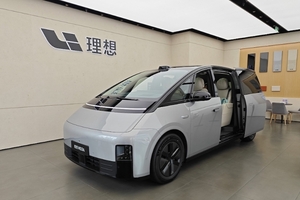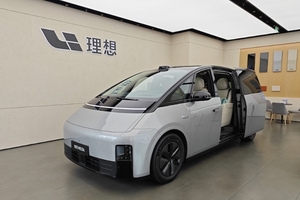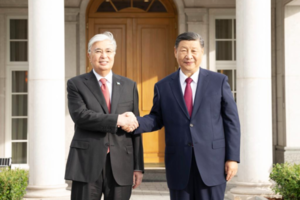In Depth: Mega Blunder Adds to Li Auto’s Troubles as Huawei Rivalry Hots Up
Listen to the full version
Li Auto Inc. (理想汽车) had reasons to be upbeat heading towards the official launch of its much-anticipated Mega electric vehicle (EV) on March 1.
Four days before the launch event, the Beijing-based company announced a remarkable milestone — it turned 11.8 billion yuan ($1.66 billion) in profit in 2023 on vehicle sales of 120.3 billion yuan. That made Li Auto the first of China’s major EV upstarts to report an annual profit. It also topped the deliveries chart among emerging EV-makers with 376,030 vehicles last year.

Download our app to receive breaking news alerts and read the news on the go.
Get our weekly free Must-Read newsletter.
- DIGEST HUB
- Li Auto Inc. reported a profit of 11.8 billion yuan in 2023 on vehicle sales of 120.3 billion yuan, and topped EV deliveries among emerging makers with 376,030 vehicles.
- The launch of their Mega EV faced backlash, leading to lower than expected sales and a class action lawsuit accusing the company of overstating demand.
- Competition with Huawei's Aito brand intensified, affecting Li Auto's financials and market share, as Huawei's models outsold Li Auto's offerings.
Li Auto Inc. faced significant challenges despite starting 2023 with a strong financial performance. The company, based in Beijing, reported a profit of 11.8 billion yuan ($1.66 billion) on vehicle sales of 120.3 billion yuan for 2023, marking the first annual profit among China's major EV upstarts and topping the deliveries chart with 376,030 vehicles sold last year [para. 2].
Enthusiasm ran high with the upcoming launch of their Mega electric vehicle (EV), designed as a seven-seat multi-purpose vehicle reminiscent of a bullet train [para. 3]. The launch, however, was marred by a viral edited image, comparing the vehicle to a hearse, and subsequent lower-than-expected orders [para. 5][para. 6]. Investors filed a class action lawsuit against Li Auto, alleging overstated market demand, following which the company reported Q1 2024 sales of 24.3 billion yuan, which fell short of the estimated 26.7 billion yuan [para. 6].
Initial high expectations for the Mega, aiming for monthly shipments of 8,000 units, were unmet as only 1,000 units were sold by mid-May 2024 [para. 8]. CEO Li Xiang expressed concerns over organized cyber defamation impacting the vehicle's image and announced intentions to take legal actions [para. 9].
Market experts like Li Yanwei criticized the ambitious sales target, noting that only one model, the BMW X5 SUV, had consistently sold over 8,000 units monthly in the high-price bracket that the Mega targeted [para. 10]. Faced with disappointing sales, Li Auto revised its Q1 sales target downward but still managed to deliver 80,400 vehicles, close to the lower end of its revised target [para. 11]. Li Xiang acknowledged misjudging the product lifecycle stage of the Mega, indicating a need to revert the strategy to a product validation phase [para. 12].
Adding to Li Auto's difficulties was its competition with Huawei's premium EV brand, Aito, which launched its M7 model in 2022—direct competition for Li Auto’s Li One SUV. The M7 quickly gained traction, forcing Li Auto to cut the Li One’s prices and expedite the launch of new models [para. 23]. This competition led to widened net losses and increased financial strain for Li Auto [para. 25][para. 27].
Despite releasing the L6 to compete with Aito’s M5 at a similar price point, Aito continued to outsell Li Auto for three consecutive months from January to March 2024 [para. 30]. Industry observers predict that while Tesla and BYD currently dominate the 200,000-yuan-plus segment of China's new-energy vehicle market, Aito may soon join the top ranks, potentially disrupting Li Auto's standing [para. 34][para. 37].
In response to Huawei’s growing market presence, Li Auto planned to intensify its focus on pure battery-electric vehicles, pushing the launch of new all-electric models to next year. The company also aims to enhance its intelligent driver-assistance systems and smart car cabin interfaces to compete more effectively [para. 38][para. 40].
The competition within China's new-energy vehicle market is expected to become even fiercer, with sales projected to grow significantly in 2024 [para. 41]. Amid these challenges, Li Auto remains committed to refining its market strategies and evolving product offerings to sustain growth and counter competition from formidable rivals like Huawei [para. 42].
- Li Auto Inc.
- Li Auto Inc., a Beijing-based EV manufacturer, reported a profit of 11.8 billion yuan ($1.66 billion) in 2023 from vehicle sales of 120.3 billion yuan. It launched its Mega EV on March 1, 2024, but faced disappointing sales and criticism. The company is involved in a U.S. class action lawsuit over alleged overstated market demand for the Mega. Li Auto competes with Huawei's Aito brand and plans to focus on new pure battery electric vehicles and intelligent technology.
- Huawei Technologies Co. Ltd.
- Huawei Technologies Co. Ltd. is a telecom equipment giant that has entered the electric vehicle (EV) market with its premium EV brand Aito, co-developed with Seres Group Co. Ltd. Aito's M7 model, launched in July 2022, competes directly with Li Auto's range-extended plug-in hybrids. Huawei's aggressive expansion in the EV sector threatens Li Auto's market position, especially with the launch of upgraded versions of the Aito M7 and M5 SUVs.
- Nio Inc.
- The article mentions Nio Inc. as one of the major Chinese EV upstarts alongside Li Auto and XPeng Inc. It indicates that Li Auto's rival, Aito, outsold these companies, including Nio Inc., for three consecutive months from January to March this year. However, the article does not provide further specific details on Nio Inc.'s performance or actions.
- XPeng Inc.
- The article briefly mentions XPeng Inc. as one of the major Chinese EV upstarts alongside Li Auto and Nio Inc. XPeng is part of the competitive landscape in China’s new-energy vehicle market. However, specific performance details or recent developments regarding XPeng are not provided in the article.
- Tesla Inc.
- In 2023, Tesla Inc. was among the top three sales leaders in China's 200,000-yuan-plus new-energy vehicle (NEV) segment, alongside BYD Co. Ltd. and Li Auto. With the industry's intensifying competition, there's speculation about whether Aito could break into this top trio in 2024.
- BYD Co. Ltd.
- In 2023, BYD Co. Ltd. was among the top three sellers in China's new-energy vehicle (NEV) market for vehicles priced above 200,000 yuan, alongside Tesla Inc. and Li Auto. Industry insiders believe BYD might shift its focus to the larger, under-200,000 yuan market in 2024.
- Seres Group Co. Ltd.
- Seres Group Co. Ltd. is an automotive manufacturer that co-developed the premium EV brand Aito with Huawei Technologies Co. Ltd. Aito's M7 model, a range-extended plug-in hybrid SUV launched in July 2022, competes directly with Li Auto’s vehicles. The brand's aggressive market entry affected Li Auto's sales and financials, resulting in Li Auto halting production of its Li One model and paying compensation to suppliers.
- GALLERY
- PODCAST
- MOST POPULAR







 Sign in with Google
Sign in with Google
 Sign in with Facebook
Sign in with Facebook
 Sign in with 财新
Sign in with 财新